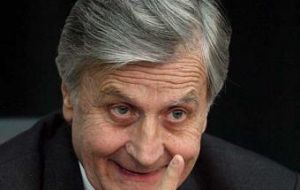MercoPress. South Atlantic News Agency
World central bankers support stronger Indus try supervision and regulation
 Jean-Claude Trichet, head of the European Central Bank and who presided over the BIS meeting described the agreement as “essential”.
Jean-Claude Trichet, head of the European Central Bank and who presided over the BIS meeting described the agreement as “essential”. Central bankers have backed new measures to strengthen supervision of the global banking industry. A meeting of the Bank for International Settlements (BIS), which consists of the world's central banks, pledged to increase bank's capital requirements.
The plans should “substantially reduce the probability and severity of economic and financial stress,” the BIS said.
But the BIS did not set out a timeline for implementation of the proposals.
The measures will be outlined in detail by year-end and be introduced in a way “that does not impede the recovery of the real economy”.
The BIS meeting comes just after the finance ministers from the Group of 20 richest nations meeting in London backed a system that rewards long-term performance rather than short-term risk-taking. But they could not agree on specific limits on the amounts individual bankers get paid.
The BIS, established in 1930 in the aftermath of the Great Depression, consists of 55 member central banks and is based in Basel.
The meeting, on Sunday, was held by members of the Basel Committee on Banking Supervision.
“The agreements reached today among 27 major countries of the world are essential as they set the new standards for banking regulation and supervision at the global level,” said Jean-Claude Trichet, the head of the European Central Bank chief who presided the meeting.
In addition to holding on to more capital, the BIS agreed to boost the standards for so-called “tier one” capital requirements - which essentially means the quality of the assets that banks have on their books in relation to their deposits.
Basel Committee head Nout Wellink, and president of the Dutch central bank, also said that banker compensation should be “properly aligned with long-term performance and prudent risk-taking.
In related news Nobel Prize-winning economist Joseph Stiglitz cast doubt on the strength of any US economic recovery, warning it may be hit by a ”double-dip“ recession.
Mr Stiglitz, a former World Bank chief economist, said ”the prospects of a robust recovery are very, very weak“. He said there was a ”significant chance“ that the economy could contract again after a period of growth.
This is what economists refer to as a ”double-dip“ recession.
”We are not seeing a recovery of sustained consumption,“ Mr Stiglitz said.
He highlighted the fact that any recovery would be the result of government stimulus packages, which could not continue indefinitely.
”The withdrawal of stimulus packages in 2011 will be a negative shock to the economy,” he said. He also highlighted continuing risks in the commercial property sector.
Stiglitz comments come when recent data suggests a more upbeat view of the US economy. Last week, figures showed that US manufacturing grew in August for the first time in 19 months and that home sales hit a two-year high in July. Last month, figures showed consumer spending continuing to rise and durable goods orders jumping sharply.




Top Comments
Disclaimer & comment rulesCommenting for this story is now closed.
If you have a Facebook account, become a fan and comment on our Facebook Page!